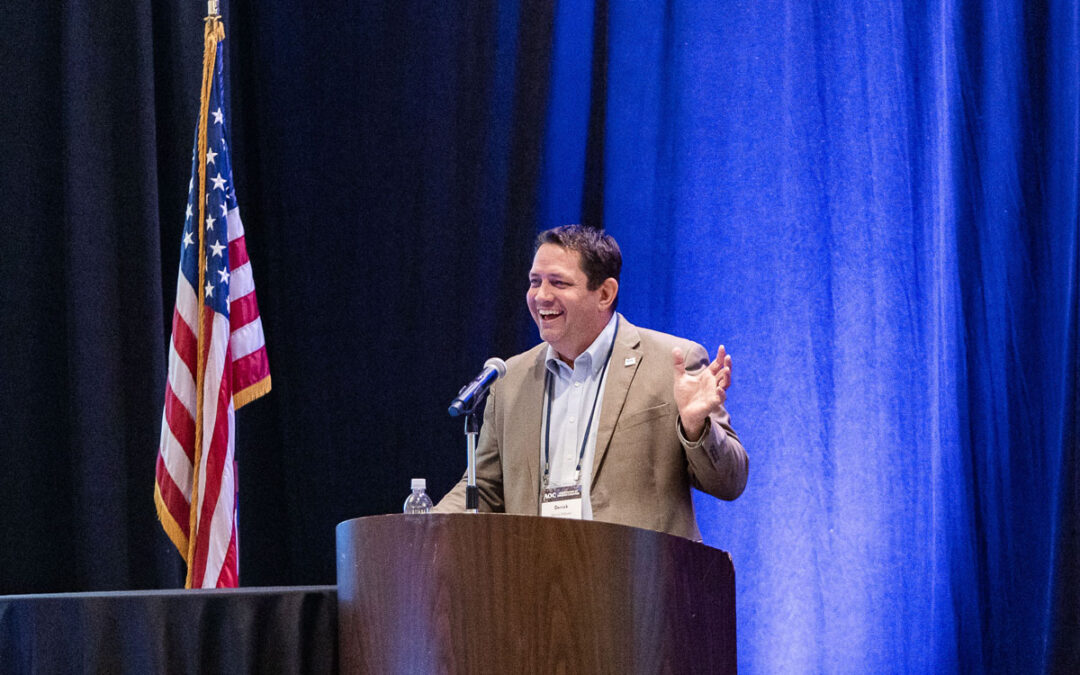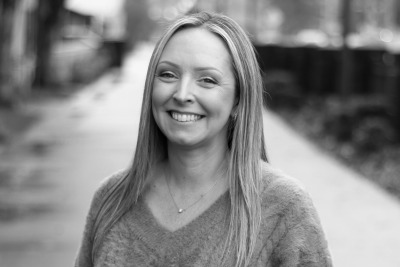
Dec 18, 2023 | AOC Business Partner
A new platform called Citizenly will bring constituents and elected officials or political candidates together in a positive way. The platform, which has launched in Oregon, is designed to improve the experience of being a citizen and public servant. We’re hopeful that county officials in Oregon will be willing to try out this early version at citizenly.com and let us know how we can improve the platform to meet your, and your constituents’, needs before we expand nationwide.
Here’s why Citizenly was started and how it’s meant to help government officials, candidates, and members of the public.
Citizenly was created because the internet, for all of the good it’s done, hasn’t necessarily improved the experience of being a citizen or public servant. In fact, the internet has arguably made it worse or harder in some ways. If you are a county official, you may have experienced it firsthand: anonymous Facebook users questioning your motives, X (Twitter) users replying to your post with personal attacks, or messages that may be from bots or non-constituents. These toxic interactions have, especially over the last few years, reduced trust locally and nationally. And it’s probably dissuaded some people from public service.
Additionally, members of the public find it difficult to know who represents them at all levels — from federal through state and county down to cities, school boards, and special districts. Simply put, nowhere before has all of this information existed in one place and been well-organized and easily accessible.
Our goal at Citizenly is to change all of that by creating a single place where citizens can go to get information and where public servants can interact with constituents in a way that welcomes discourse and disagreement, but constructively.
Here’s how it works now, in our “beta” phase, and how we envision it developing in the future. Again, we’d love for county officials in Oregon to sign up and help us find ways to improve it before it expands nationally!
In our first release, any resident of Oregon can sign up for free and immediately see all of their elected officials and candidates, along with key information about each. If you are an elected official or candidate, you can also sign up for free and check your profile.
We’re also really proud to have compiled the world’s first and most complete database of every elected official and political candidate in the country, from the President to school boards and special district officials. Our goal for all states is for our data to always be 99%+ complete and 99%+ accurate at any one time — a standard we’ve already met and exceeded in Oregon. (We’ve aggregated all of this information from public sources and don’t distribute any private information.)
So, what’s our vision for Citizenly, and what’s to come? In the months ahead, we’ll be steadily iterating Citizenly to be a little like a mashup of LinkedIn and NextDoor: where those platforms connect users based on professional network or neighborhood, we’ll connect users based on jurisdiction or constituency, as well as political or policy issues of common interest. As an elected official or candidate, you’ll be able to “claim” your profile and update key fields, like your photo and information about you and your role. We’ll offer various outreach and compliance tools, such as surveys for the former and records retention and public meetings notices for the latter. Underneath it all, as a county official, you’ll be able to see whether the person you are interacting with is actually a constituent or not. We’ll be working hard to balance freedom of expression with a prohibition against personal attacks and clearly false statements. In short, Citizenly is intended to be a one-stop shop for sharing and obtaining reliable information, and interacting with others based on constituency or shared policy interests. It’s also meant to be an inclusive place that welcomes people across the political spectrum.
But first things first. We’re really excited about this early version of the platform; however, like any early version, we know that there will be some things we didn’t anticipate or didn’t fully think through. We’d be enormously grateful to any county official in Oregon who signs up (it’s free) at citizenly.com. We welcome feedback from constituents and everyday users as well.
Thanks to Oregon’s county officials for your service and thank you in advance for giving Citizenly a try.
John Horton is the founder and CEO of Citizenly. Prior to founding Citizenly, he worked at the county, state, and federal levels, first as a deputy district attorney in Multnomah County, then as legal counsel to the Oregon House Judiciary Committee, and later as a White House aide. He subsequently founded an Oregon-based technology company, LegitScript, where he served as CEO and Chairman for 15 years. Citizenly is headquartered in the Portland, Oregon, area and has approximately a dozen employees. Citizenly is not a partisan organization, and its employees’ political views span the political spectrum.
*Sponsored content provided by AOC Business Partner Citizenly

Dec 7, 2023 | AOC News
“Get work done,” was Klamath County Commissioner DeGroot’s objective as AOC president this year.
AOC’s commitment to achieving results and addressing county issues was apparent at the 118th AOC Annual Conference as commissioners, judges, county staff, and agency leaders from around the state came to Lane County for three days of networking, learning, and building relationships to solve county issues.
“The conference reflected the work of the association this year,” said DeGroot, “where we refined processes that put us on a path to find common ground and work out our differences to move the association together.”
Over 500 attendees registered for some part of the conference, held Nov. 11-14, at the Graduate Eugene. Presenters discussed finding solutions to problems affecting Oregon counties, rural and urban, large and small. Session topics ranged from preventing wildfires and cyberattacks to addressing the opioid crisis and homelessness.
The event included a preconference for first-year commissioners, judges, and chairs who participated in the 2023 County College program. The half-day session provided an opportunity for reflection on their first year in office and to hear from educational speakers on public meeting laws, partner engagement, and RFP best practices.
Acknowledging differences and how they can strengthen relationships was also the focus of both general sessions. Oregon State Representatives Mark Owens (R-Crane) and Ken Helm (D-Beaverton) discussed how they have found success working across the aisle and together with local governments to craft and pass complex, meaningful legislation on issues that impact all of Oregon.
Brian Miller, a magician turned motivational speaker, provided a unique and engaging experience for attendees during the general session. By incorporating magic tricks, Miller emphasized the importance of perspective-taking and making connections.
Lincoln County Commissioner Casey Miller thought the conference was a great opportunity to challenge his assumptions and learn from others. “I feel like AOC is really nailing it with articulate legislative and steering policy principles,” he said. “Finding our unity amidst our diversity with a collaborative mindset is how I also want to approach governance at home.”
A new addition to the conference was a celebration of AOC’s partner program. The program has grown exponentially in the last few years, with over 60 partners joining the partner program this year. To recognize the program’s success, a membership committee and partner appreciation dinner was held during the conference as a celebration of counties and the partners that support local government in successfully serving their communities.
The last full day of conference concluded with officer elections and the county product tasting. The 2024 AOC Executive Officers who were installed during the annual business meeting are President Danielle Bethell (Marion), First Vice President John Shafer (Umatilla), Second Vice President Erin Skaar (Tillamook), Treasurer James Williams (Lake), and Immediate Past President Derrick DeGroot (Klamath).
The must-attend event was again the county product tasting, where twenty-three counties showcased unique products representative of local agriculture and businesses. Attendees enjoyed sampling seafood from Lincoln County, fry bread and salmon from Jefferson County, ice cream from Wasco County, and much more.
The annual conference also included remarks from Governor Tina Kotek, a virtual Q&A with Senators Jeff Merkley and Ron Wyden, and ample networking opportunities, including an agency partner meet and greet and meetings with federal delegation staff.
“This time together provided us with an opportunity to connect with each other, talk through potential disagreements, find out where we are aligned, and really try to problem solve on behalf of our communities,” said Executive Director Gina Nikkel. “We look forward to working with President Bethell and all our members next year to support counties and their communities.”
Contributed by: Erin Good | Communications Coordinator

Dec 5, 2023 | AOC News
The Association of Oregon Counties (AOC) has hired Malea Stockton as Member Services and Education Coordinator.
Stockton joins AOC with a strong background in nonprofit administrative management and will be a valuable member of the organization. She brings extensive experience in event planning, accounting, and donor relations, most recently serving as chief administrative officer for a mental health nonprofit organization.
Stockton will support the member services and education department, planning events and supporting education programming and the partner program.
“I am pleased to welcome Malea to the AOC team and am confident her unique skills and experience will elevate our member services and contribute to the continued success of the partner program,” said AOC Executive Director Gina Nikkel.
Stockton’s first day was Dec. 1, 2023.
Contributed by: Erin Good | Communications Coordinator

Oct 31, 2023 | AOC Advocacy
On Oct. 12, 2023, three people who lost their homes to foreclosure over unpaid property taxes filed a lawsuit against the counties that foreclosed on them in the U.S. District Court for the District of Oregon. The lawsuit demands refunds of any proceeds of foreclosure sales that exceeded plaintiffs’ debts to Lane, Multnomah, and Yamhill counties, and pertains to sales that took place as far back as May 25, 2017. It seeks to be recognized as a class action on behalf of all similarly situated former homeowners. Counties have been anticipating lawsuits like this one ever since news broke of the U.S. Supreme Court decision, Tyler v. Hennepin County.
On May 25, 2023, the high court ruled that a 94-year-old woman should have received a refund from Hennepin County, Minnesota after they foreclosed on her condo over $17,300 in unpaid property tax, interest, and penalties, and sold it for $40,000. Minnesota is among 14 states, including Oregon, where the foreclosure process provides for the delinquent property being forfeited in its entirety. Under Oregon law, counties retained the proceeds of foreclosure sales, even if the proceeds exceed the taxes, interest, and penalties that were owed. The State of Oregon had filed a “friend of the court” brief in the case, defending Hennepin County against the suit. The ruling held that such processes violate the Takings Clause of the Fifth Amendment to the U.S. Constitution.
AOC expects that soon every county in Oregon will be targeted by similar lawsuits over foreclosure sales, including sales that may have taken place many years ago. Preliminary discussions with CIS, who provides insurance to most Oregon counties, indicate that none of these losses are likely to be covered by insurance. Considering how tight county budgets are, fears are growing over how counties can possibly afford obligations associated with the lawsuits without making catastrophic cuts to critical services such as libraries, policing, and public health programs, or even going bankrupt. AOC is working with counties now to develop an estimate of county legal liability statewide, and are seeking state funding to assist counties with these costs.
Counties in many other states have already seen similar lawsuits. Last year, Oakland County, Michigan settled a similar case for $38 million, and this spring, forty-three other Michigan counties agreed to settle a similar lawsuit, in an agreement estimated to cost tens of millions of dollars.
Getting state help with these costs was identified by AOC membership as our top priority for the 2024 legislative session in the governance and revenue portfolio, along with limiting liability around future foreclosure sales surpluses and establishing new statewide guidelines for how to handle foreclosures. Most states have laws setting reasonable time limits for filing a claim over foreclosure surpluses, which helps counties avoid surprise claims impacting already-budgeted funds – Oregon does not.
There are some steps counties can take by themselves to limit liability associated with future foreclosure sales, but for every one of Oregon’s 36 counties to develop and enact their own ordinance will be a costly exercise, and having a patchwork of varying approaches across Oregon doesn’t make any sense.
At their September meeting, the AOC Governance and Revenue Steering Committee convened a workgroup to develop a legislative proposal for 2024 that addresses these issues. A group of about a dozen county staff who have legal or property management expertise met on Sept. 18, with Marion County Assistant Legal Counsel Scott Norris leading the group in efforts to craft a draft proposal. AOC is working hard to secure introduction of the proposal as a bill for consideration in the 2024 legislative session.
Contributed by: Michael Burdick | AOC legislative affairs manager
Oct 27, 2023 | Events
Online registration closes Monday, Oct. 30, for AOC’s Annual Conference, held in Lane County, Nov. 14-16. The annual conference draws together a cross section of elected officials, county staff, partners, and other participants for educational opportunities, leadership development, and networking. Attendees from rural and urban counties, large and small, participate in the three-day event aimed at improving residents’ lives and the efficiency of county government.
AOC President and Klamath County Commissioner Derrick DeGroot played an integral part in developing this year’s educational programming and finding ways to unite county officials and connect throughout the event. “My focus as AOC president during the 2023 legislative session was to improve the status of counties in the state capitol,” said DeGroot. “Spending six months in Salem reaffirmed my belief that building meaningful relationships is critical to strengthening the state-county partnership and achieving policy solutions that result in efficient and effective delivery of services to the public.”
Concurrent sessions will cover topics ranging from preventing wildfires and cyberattacks to exploring solutions for homelessness, the opioid epidemic, and the mental health crisis.
Also during the conference, Oregon’s U.S. Senators Wyden and Merkley will both step off of the Senate floor for a “couch session” live from Washington D.C., and Brian Miller, a magician turned international speaker on human connection, perspectives, and understanding, will talk on “Connecting with Purpose: How to Magically Connect with Anyone.”
“AOC’s Annual Conference has continued to provide education and networking opportunities for counties for over a century,” commented AOC Executive Director Gina Firman Nikkel, Ph.D. “This unique gathering offers commissioners, judges, chairs, county staff, and partners across the state to come together and explore innovative solutions to county issues, learn from their peers, and develop key relationships. I look forward to this year’s programming lineup which will focus on preventing and solving the top issues that impact counties.”
Online registration closes Monday, Oct. 30.
Please register before Oct. 30, to secure the reduced rate. After Oct. 30, prices will go up, and registration will have to be done on site. Find registration fees and more information on AOC’s conference webpage.
Contributed by: Erin Good | Communications Coordinator




